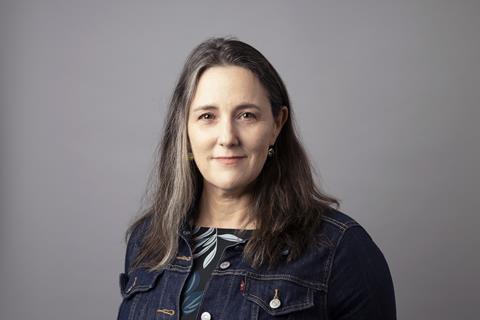
A high-quality Dox:Award competition is augmenting CPH:DOX’s position as the go-to documentary event of the season according to industry attendees, as its 2023 edition came to a close this weekend.
“With some festivals becoming more cutting-edge politically and artistically, we do need a place we can distribute titles, where there is a demand for the best programmes for existing and new audiences,” said Esther van Messel, founder and CEO at Swiss production, sales and distribution company First Hand Films, who said the event is ”gearing up to be the place for non-fiction fans in the spring.”
For the first time, the festival presented a complete lineup of world premieres in its main Dox:Award competition.
Artur Liebhart, director of Poland’s Millenium Docs Against Gravity Film Festival which also distributes non-fiction titles in the country as Against Gravity, noted “intriguing, eye-opening films both in themes and styles of aesthetic and filmmaking, confirming that the documentary genre is able to be in dialogue about the present and future.”
Highlights for Liebhart in the main competition were Eric Gandini’s working world study After Work; Christoffer Guldbrandsen’s long-awaited Roger Stone film A Storm Foretold; and Jialing Zhang’s Total Trust, about China’s surveillance state.
It was the “right decision” to only have world premieres in the competition, according to Kim Foss, CEO of Danish distributor Camera Film (prior to the event the festival told Screen that the full world premiere selection was a coincidence). A regular at the event, Foss said the competition programme was “particularly good this year.”
“As a buyer it’s an extra gift to enjoy screenings in the company of local, paying audiences,” said Foss, who chose After Work and Nicolas Peduzzi’s On The Edge – recipient of a special mention – as his top titles. “I was also happy to learn the local films in competition weren’t there because of the usual home ground advantage,” he added, predicting wide international sales for Danish productions A Storm Foretold and Emil Langballe and Lukasz Konopa’s Theatre Of Violence.
Camera Film is the Danish distributor for Lea Glob’s Apolonia, Apolonia, which had its world premiere at IDFA in November and played in the Highlights strand at CPH:DOX. Foss released the film in Denmark during CPH:DOX, “to profit from early, successful festival screenings and, as it turned out, incredible word of mouth. Numbers for this first weekend are good, and presales for the next coming week proves that audiences might suffer from some degree of festival fatigue, but if you can provide the right films, they will turn up again.”
Forum flourish
CPH:Forum, the festival’s financing and co-production event, presented 44 projects, up from 36 last year. The selection “dazzled us with political and innovative storytelling while always being aware that it is cinema that brought us together in the first place”, said Aleksandar Govedarica, co-founder of Toronto-based Syndicado Film Sales, who selected Suki Chan’s UK project Conscious, about the human mind, as his personal highlight.
Six of the Forum projects, including Eurimages development award winner Red Zone, have come through the Production Assistance Program of non-profit US arts organisation Women Make Movies (WMM). Debra Zimmerman, WMM executive director, noted an “extremely high” quality level, and was “impressed that almost half of the projects were by women directors or co-directors,” while noting that “the projects were very North American/Northern European.”

“The marketplace remains a challenge what with public broadcasting struggling for appropriate funds and slots for documentaries and streamers having a limited appetite for anything less than ‘iconic’,” said van Messel. “Independent films don’t finance themselves with impact-budgets alone. That said, CPH:DOX was lively, vibrant and sharp and definitely marking its place – I hope it’s going to grow further as I find it highly exciting.”
The festival is also establishing itself as a key point for new business, with the launch of two companies at this year’s event. UK-based production and distribution house Fremantle unveiled Undeniable, a new label for feature and series documentaries. “We don’t want to play favourites with festivals as they are all important to us, but the timing worked for us and CPH is a festival and pitching forum I have a strong ongoing relationship,” said Fremantle’s global head of documentaries Mandy Chang, who will head up the Undeniable.
“The festival and the forum have grown in international status year-on-year, with many industry people, filmmakers, commissioners, festival directors and programmers and other industry heavyweights coming into Copenhagen from around the world,” Chang continued. “It felt like a good place to announce from.”
Fremantle’s cult film documentary Kim’s Video played in Highlights after its Sundance world premiere, while the company is also on board UK-Denmark Forum title Two Strangers Trying Not To Kill Each Other from director Jacob Perlmutter, producer Manon Ouimet and Flee producer Signe Byrge Sorensen.
Copenhagen was also the launchpad last week for Indie Film Bergen, a Norwegian company that unites producer Thorvald Nilsen with Oslo-based non-fiction stalwarts Indie Film. Oscar-winning Free Solo filmmakers Elizabeth Chai Vasarhelyi and Jimmy Chin also used the festival to announce their next film Endurance about Ernest Shackleton’s long-lost ship, co-directed with Natalie Hewit.
This year’s festival wasn’t just about building the screen product, but the screen itself, with the Danish Film Institute (DFI) giving tours of the rooftop renovation of its central Copenhagen Cinemateket venue. The 1,700m2 rooftop space will include a 128-seat outdoor cinema with covering for wet weather; film exhibitions; and a cafe and playground. Work began in autumn 2020, and will complete this summer with the venue expected to be in use at next year’s CPH:DOX. ”By creating this rooftop terrace we want to make film history more accessible and engaging for a broader audience - both residents of Copenhagen and visitors to the city,” said DFI CEO Claus Ladegaard. ”By providing a range of film-related activities in one space, we hope to offer a unique and engaging experience that celebrates the rich and diverse heritage of cinema while inspiring new generations of film enthusiasts.”
Ukraine endures
CPH:DOX remains a space for representing the political issues of the day. The shorter turnaround on non-fiction films has allowed the documentary community to react quickly to the war in Ukraine – the subject of Forum winner Red Zone. Dox:Award winner Motherland, a Ukraine co-production through its Belarusian-Ukrainian producer Alexander Mihalkovich who directs alongside Hanna Badziaka, takes aim at the military regime of Russian ally Belarus. Several awardees at Friday’s ceremony spoke in support of Ukraine, none more succinctly than Agniia Galdanova, Russian director of Next:Wave section winner Queendom, who simply said “Fuck Putin!”
In centring women’s voices, CPH:DOX is succeeding as a festival where many others are failing. Five of the six competition sections were won by films directed or co-directed by women. This was also true for the industry strand: 19 of the 26 speakers on the Future At Our Fingertips CPH:Conference programme were women, with an equal male-female split across the Dialogues On Craft and Artists & Auteurs programmes.
”Women generally excel in a community-driven thinking, in an overwhelming majority insist on the ethics of the work they lead, and prioritise environmental and community protection,” said Tereza Simikova, head of industry at CPH:DOX, who organised the conference programme. ”Nothing in the ‘permiacrisis’ we are going through as a filmmaking community and the society at large suggests we need less female leaders.”
In her session in the Artists & Auteurs group, Vasarhelyi spelled it out. ”Whenever I give talks, I say ladies, please self-advocate,” said the director. ”Because people won’t necessarily notice.”






![The Brightest SunScreen[Courtesy HKIFF]](https://d1nslcd7m2225b.cloudfront.net/Pictures/274x183/3/5/0/1448350_thebrightestsunscreencourtesyhkiff_312678.jpg)


















No comments yet